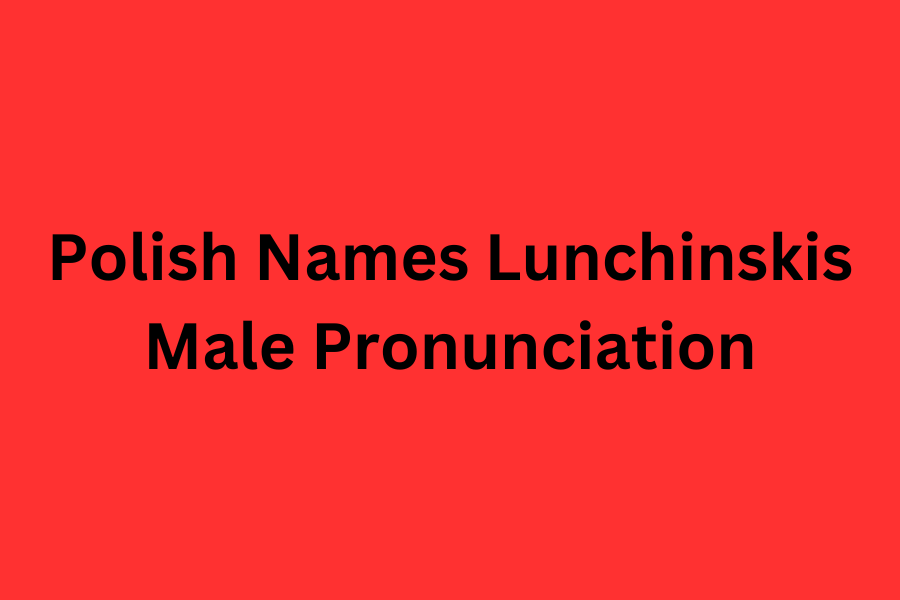A Complete Guide to Polish Names Lunchinskis Male Pronunciation
Introduction to Understanding Polish Names Lunchinskis Male Pronunciation
Welcome to our guide on Polish Names Lunchinskis Male Pronunciation. Polish names carry rich cultural and historical significance that often goes unnoticed. Each name is a reflection of family roots, traditions, and sometimes even the occupations of past generations. If you’ve come across the surname “Lunchinski,” you might be curious about its origin and the proper way to pronounce it. While Polish male names might initially seem challenging, with a bit of practice, anyone can master them.
Whether you’re interested in connecting with your heritage or want to impress others by pronouncing names correctly, learning about Polish names is an enriching journey. This guide will walk you through the structure of these distinctive names and provide tips on pronunciation—particularly for those more complex ones, like Polish Names Lunchinskis Male Pronunciation. Let’s begin!
The Structure of Polish Names Explained
Polish names follow a unique structure, often reflective of deep cultural and familial traditions. Typically, a Polish name consists of a given name followed by a surname.
A first name is generally chosen based on family significance or tradition, carrying personal meaning for the individual and their family.
Surnames, on the other hand, may indicate family lineage, occupation, or geographic roots. They often end in specific suffixes like “-ski,” a signifier of nobility or a connection to a particular place.
An interesting feature of Polish surnames is their gendered variations. For instance, “Lunchinski” for males becomes “Lunchinska” for females. Understanding this distinction is key to comprehending the structure of Polish names and their cultural significance.
Exploring Polish names reveals a wealth of history and language embedded within each one. These names tell a story, waiting to be uncovered.
Popular Polish Surnames and Their Origins
Polish surnames often carry meanings rooted in the country’s diverse history and cultural heritage. Many of these names are linked to occupations, geographic features, or traits associated with ancestors.
For example, “Kowalski” comes from the word “kowal,” meaning blacksmith, reflecting a family’s association with this important trade in Polish society.
Another common surname, “Nowak,” means “newcomer,” often signifying someone who recently arrived in a community, shedding light on Poland’s history of migration.
“Szymański,” a surname derived from the hawthorn bush, suggests a geographical connection, indicating families who lived near these plants or who drew inspiration from them.
These surnames aren’t just identifiers; they are narratives of professions, places, and stories passed down through generations. Understanding the meanings behind them deepens our appreciation for Polish culture and history.
Distinctive Traits of Polish Male Names
Polish male names are rich in cultural meaning and often have Slavic origins that reflect both historical and regional influences.
A unique feature is the use of diminutive forms. These affectionate, shortened versions of names can change a formal name like “Marek” into “Marekiek” or “Maruś,” adding warmth to personal relationships.
Another notable aspect is the prevalence of patronymic surnames. Polish names frequently indicate lineage, such as ‘Nowak,’ which translates to ‘new man,’ signifying connections to heritage or birthplace.
Additionally, many Polish names carry meanings tied to virtues or natural elements. For instance, ‘Bartosz,’ meaning ‘son of Bart,’ not only highlights family ties but also reflects values cherished within Polish culture.
The musicality of Polish names is also significant. The accented syllables add rhythm and flow, giving the names a melodic quality that is unique among global naming traditions.
Tips for Pronouncing Challenging Polish Names
Pronouncing Polish names can be tricky, especially when dealing with unfamiliar sounds.
Take “Lunchinski” as an example. The proper pronunciation is “Loon-chin-ski,” with emphasis on the second syllable. This pronunciation gives the name its distinctive character.
The “ń” sound is particularly difficult; it is a blend of ‘n’ and ‘y.’ With practice, you can master this unique sound.
Another common challenge in Polish names is consonant clusters, such as the “cz” combination, which produces a sharp “ch” sound. It’s similar to saying “chop” but softer and quicker.
Listening to native speakers or using language apps can significantly help with pronunciation. Over time, repetition will build your confidence and improve your pronunciation. Getting familiar with the rhythm of these names will make them easier and more enjoyable to pronounce.
Effective Strategies for Memorizing and Pronouncing Polish Names
While remembering and pronouncing Polish names may feel overwhelming at first, breaking down the name into syllables is a helpful strategy. This makes even the most complex names more manageable.
Try associating the sounds with familiar words or phrases. For instance, you could think of “Lunchinski” as “lunch” and “skinny,” which may make the pronunciation easier to recall. Visual aids like writing the name out phonetically or creating flashcards can also help reinforce the pronunciation.
Listening to native pronunciations through audio resources is a great way to get familiar with the sounds. There are plenty of online tools and videos available to assist you.
Practice saying the names out loud every day. Repetition builds familiarity and confidence.
Don’t hesitate to ask native speakers how to pronounce their names. Most will appreciate the effort and might even share additional tips to help.
The Importance of Accurate Name Pronunciation
Names are more than just identifiers—they carry deep meaning, reflecting one’s identity, culture, and heritage. Mispronouncing someone’s name can unintentionally convey a lack of respect or disregard.
For individuals with unique names like Lunchinskis, correct pronunciation is crucial. It honors their heritage and acknowledges their family history. When you take the time to learn the correct pronunciation of a name, it fosters understanding and connection.
Whether in social or professional settings, correctly pronouncing someone’s name helps build rapport and shows respect for the individual. This simple yet powerful gesture can create a more inclusive environment where everyone feels valued.
Furthermore, in a multicultural world, proper pronunciation of names encourages cultural appreciation. By making the effort to pronounce names correctly, we can break down barriers and build stronger, more meaningful relationships.
Key Facts about Polish Names Lunchinskis Male Pronunciation:
- Polish Names Lunchinskis Male Pronunciation follows specific phonetic rules, where the name is broken down into “Loon-cheen-skees,” with the emphasis on the second syllable.
- Understanding the Polish Names Lunchinskis Male Pronunciation can help individuals correctly pronounce not just this particular surname, but also other Polish names that share similar linguistic patterns.
- The surname Lunchinskis is a Polish name that may reflect geographical origins, often linked to a place or region in Poland, and learning its Polish Names Lunchinskis Male Pronunciation can help preserve cultural and historical ties.
- Mastering the Polish Names Lunchinskis Male Pronunciation is essential for those wanting to connect with their Polish heritage, as accurate pronunciation shows respect for the name’s history and the individual’s family.
- The Polish Names Lunchinskis Male Pronunciation is an example of how Polish surnames often end in “-ski,” which is a common feature for many male names in Poland, signifying a historical connection to nobility or a place.
Wrapping Up: The Significance of Polish Names Lunchinskis Male Pronunciation
The journey to understanding Polish names is rewarding and insightful. Every name carries a story filled with history, culture, and personal significance.
While pronunciation may seem intimidating at first, especially for names like Lunchinskis, regular practice will make the process easier. Familiarizing yourself with these unique sounds opens doors to deeper connections within the Polish community.
Knowing how to pronounce a name correctly is a sign of respect, demonstrating that you value someone’s heritage and identity.
Take on the challenge with enthusiasm. Enjoy discovering the different pronunciations and meanings behind each name.
And remember, every effort you make in honoring diverse cultures through language matters.
Commonly Asked Questions (FAQs)
Grasping the pronunciation and meaning of Polish names can be tricky, especially when it comes to surnames like Lunchinskis. Below are some common questions and answers that could help clear up any confusion.
What is the origin of the surname Lunchinskis?
The surname Lunchinskis is likely linked to a specific region or settlement in Poland. It may refer to ancestry tied to a particular area, marking geographical roots in the family history.
How should you pronounce Lunchinskis correctly?
To pronounce Lunchinskis, say it as “Loon-cheen-skees,” with the emphasis on the second syllable. Breaking the name into parts can make it easier to pronounce accurately.
Do Polish surnames have different spellings?
Yes, it’s quite common for Polish surnames to have various spellings due to regional dialects, historical factors, or changes over time. When researching Polish ancestry, it’s important to keep these variations in mind.
Why are Polish names difficult to pronounce for non-native speakers?
Polish contains certain sounds that are not present in English, making pronunciation challenging for English speakers. With practice, however, these sounds can become more familiar and easier to master.
Is it true that all Polish male surnames end in “-ski”?
Not all Polish male surnames end in “-ski.” While many do, reflecting historical or regional influences, some names may follow different conventions or end in alternative suffixes.
Can learning to pronounce one Polish name help with others?
Definitely! Once you understand the pronunciation rules and patterns common in Polish names, it becomes easier to tackle other names with similar phonetic structures.
With consistent practice and the right guidance, mastering Polish name pronunciations is entirely possible. Dive into this cultural exploration and enjoy the process of learning these unique names!
Stay connected for the latest news and updates on Rater Point!







